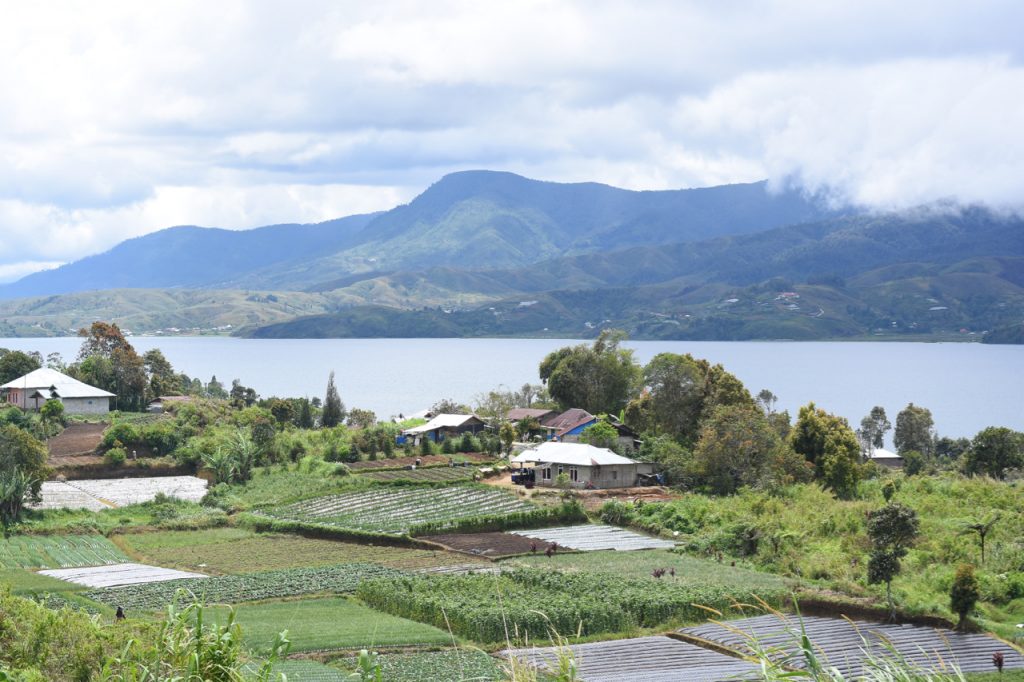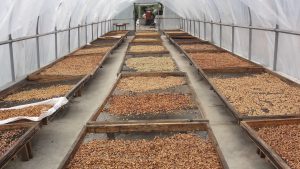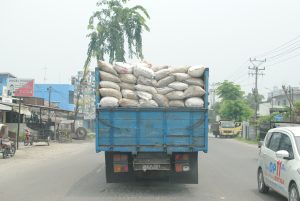If you would like more than 8 samples, please contact a trader directly.
Cart
A trader will contact you with shipping and payment options after checkout. Please note: free samples are provided to commercial roasting businesses only.
Clean. Sweet. Acidic. Three words not usually associated with Sumatra. For this and many other reasons, Sumatra seems to be slipping out of favor within specialty.
We in the specialty community tend to prefer subtlety over strength, and traceability over year-over-year consistency. But still, we source from Sumatra because these consistently unique, strong profiles make perfect ingredients for blends, and appeal to our customers who aren’t on the quest for ‘hints of jasmine’.
However, last season’s price peak prompted many long-time Mandheling, Gayo or Lintong loyalists throw their hands up at the volatility, jump ship, and look for options elsewhere. We’ve fielded many requests for earthy PNGs or Ugandans to reblend around Sumatra.
More and more, Sumatra is drifting further to the peripheries of specialty, which is so unfortunate given all the good work that is going on under the radar.
Odd-sounding Robusta hybrids, funky-smelling wet-hulling processing and consistent contract failures have kept many buyers from making the long journey. Those that get there find that rigid structures, easy opportunities outside of coffee, murky green grading standards, opaque middle-men and year-over-year failures at the farmer-group level make this a difficult place to work anywhere below export-level.
But, let’s be honest, Sumatran coffee has been around a long time and for many, myself included, was the very first Single Origin we learned by name. You can’t find this flavor anywhere else, and where else in the world can you find volcanic top soil over twelve feet thick?

And so, in as few words as possible I endeavor to argue that Sumatra should still have a place on specialty menus, and why now – more than ever – is the time to get on board.
The first misconception about specialty in Indonesia is that it is not possible, because the genetic stock are robusta hybrids. Yes, in the early 20th century Indonesia’s coffee crop was wiped out, and yes, much of this was replaced with HDT (Hybrid de Timor) (Bourbon x Robusta), its direct descendant Tim Tim, or the more modern Sigarar Utang (Tim Tim x Bourbon).
So HDT is a Robusta blend that has been watered down with more Arabica through Tim-Tim and to Sigarar Utang (Ateng). But there are pure Arabica strains as well, like Jember (Bourbon x Typica), USDA (Ethiopian Arabica transplant), and Onan Ganjan (Jember x Bourbon). One of the coffees on this list here is a pure bourbon. The gene stock is there if you look for it.
But what about wet-hulling, you say? Wet-hulling, the process of partially drying coffee, hulling it, and then letting it ferment slightly in transit on the way to the mill. Well, it’s got its place – we’ve found a consistent (but not universal) preference for wet-hulled coffees over their washed, semi-washed or natural counterparts. Traditional processing is part of what gives a geography its flavor; you could look to countless examples of such happy mistakes in beer, wine or cheese.
But haters hate, and some people just can’t get behind the funk. Which is understandable when the rest of your menu is filled with clean, sweet, acidic coffees. But even if your variety falls within these walls you are in luck, because Sumatra can do clean and sweet as well.

We feature a washed coffee out of South Sumatra (Kerinci), for example, and have seen our suppliers experiment more and more with alternative processing methods. Washing stations are becoming more normal, and more middle-men are buying directly in the cherry to process themselves, skipping the wet-hull process altogether. This coffee may not even make it to market as ‘fully washed’, but it is. So while ‘sparkling’ is still going to be a rare note to come off of a table full of Sumatrans, we are seeing cleaner and cleaner coffees every year, especially from outside traditional growing areas, like in South and Central Sumatra.
But even the cleanest of coffees, you point out, still have to get to the city of Medan, which has all of Sumatra’s export infrastructure. More, you hear that the export game in Medan is a cluster.
Well, you hear correctly. Especially now – after last year’s crop failure (and resulting price spike) many businesses defaulted on contracts and closed their doors. Sumatra’s export scene has always been dominated by an odd mixture of politics and lawlessness, of loyalty and shifting allegiances. This year it is even more of a mess. Still, this is a solved problem. Get the right export partners, set clear standards and calibrate consistently. If you take these steps you are likely to see your coffee through on-time and as ordered.

And that’s the case here. We’ve long worked with Septy, one of our favorite people in coffee, around the Lake Toba area and Kerinci in the South. Her work continues, and continues to impress, but demand is flagging and we are having to slow down. This, despite the fact that qualities are up and prices are falling back to pre-bubble levels.
And today we are introducing new partners – two coops from Gayo Aceh who demonstrate the same potential as we’ve come to know with Septy. The KGBM represents 2,276 farmers in Tengah Aceh district, Jagong Jeget Sub-District, and brought us a unique and genre-bending bourbon micro-lot this year. The Pegasing Farmers Group has about the same number of equally small farmers, is located about 2 hours up mountain from Takengon, and brings us a coffee to challenge our Lintong Batak Nauli in quality, the Arual Badak.
As we continue to find good people in coffee we will continue to look for ways to support them. If we fail, for even one year, then they find work outside of coffee. This is similar to roasters who have a failure with Sumatra one year and look elsewhere the next.
But specialty doesn’t care too much about consistency. We care about cup character, unique flavors and compelling stories. Sumatra has all of these, in abundance, at price points equal to high-specialty coming out of Africa and Latin America. Why, then, are we not looking at what Sumatra can offer to the specialty Single Origin side of our menu?
Now, more than ever, it is important to get behind good people, and the good coffee that they are bringing out out of Sumatra. Take a look at these lots, maybe one of them will give you reason to believe.
| N. SUMATRA ACEH, ARUL BADAK
Elevation: 5,250 -6,000 ft |
|
CUPPING SCORES / TASTING NOTES Cup: Pineapple, green apple, kiwi, plum jam, cilantro, chocolate |
| N. SUMATRA ACEH, JAGONG, JEGET BOURBON MICRO-LOT
Elevation: 5,200 – 5,500 ft |
| CUPPING SCORES / TASTING NOTES
Cup: Green apple, prunes, clementine, toffee, prunes, brown sugar, bell pepper |
| S. SUMATRA, JAMBI PROVINCE, KERINCI, FULLY WASHED
Elevation: 5,200 – 5,500 ft |
| CUPPING SCORES / TASTING NOTES
Cup: Balanced milk chocolate, sticky kiwi, graham cracker, lemon, prune, blackberry finish |
| S. SUMATRA JAMBI PROVINCE, KERINCI, WET HULLED
Elevation: 5,200 – 5,500 ft |
| CUPPING SCORES / TASTING NOTES
Cup: Jackfruit/Dorian, milk chocolate, pineapple fruit leather, big body, lingering tropical finish |
| SUMATRA LINTONG, BATAK NAULI, WET HULLED
Elevation: 5,200 – 5,500 ft |
| CUPPING SCORES / TASTING NOTES
Cup: Pineapple, mango, sunflower butter, bell pepper, citrus |
View our current offers here to keep an eye on this coffee coming out of Sumatra.